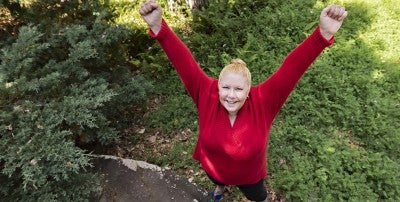
Toni Filosa, 55, of Lords Valley, Pa., had a stroke in 2016. On the heels of that, her doctor ordered a transesophageal echocardiogram (TEE), which uses sound waves to produce real-time images of the heart. Filosa would fully recover from the stroke, but the TEE revealed a new concern: Filosa had hypertrophic cardiomyopathy (HCM).
HCM is the most common inherited heart condition in the U.S., affecting one in 500 people. The condition causes the walls of the ventricles – the heart’s chambers – to thicken. This thickening alters the pumping function of the heart. Although most people with HCM lead normal lives, it is the primary cause of sudden cardiac arrest and death in people under age 30, especially young athletes.
Filosa began seeing Lehigh Valley Heart and Vascular Institute cardiologist Anil Gupta, MD, with LVPG Cardiology–East Stroudsburg. He recommended that she continue taking medications to improve her symptoms of HCM.
Losing her breath
Every six months, Filosa had an appointment with Gupta. For a time, all was well. But in 2017, she experienced shortness of breath and knew something was wrong. A comprehensive evaluation revealed that Filosa’s HCM had progressed, and medication was no longer enough to manage it.
Gupta referred her to Lehigh Valley Heart and Vascular Institute’s HCM center, one of only four HCM specialty centers in Pennsylvania. The center sees 250 to 300 patients with HCM annually, ranging in age from 15 to 85.
Though Filosa’s medication had previously been the right treatment, since HCM had worsened, she now needed an open-heart surgical procedure called a septal myectomy. It removes thickened tissue from the septum (wall) between the heart chambers so that pumping and blood flow improves. People who have this surgery typically have no further symptoms.
Building confidence before surgery
The news was daunting, but Filosa credits her Heart and Vascular Institute doctors with preparing her to move forward. “They explained everything so well, I was the calmest I’ve ever been in my life,” she says.
On her birthday, Filosa met with cardiothoracic surgeon James Wu, MD, with LVPG Cardiac and Thoracic Surgery and Chief of Cardiothoracic Surgery at Lehigh Valley Heart and Vascular Institute. “Dr. Wu had my MRI up on a screen and showed me everything,” Filosa says. “He explained that he had developed expertise in the procedure and had performed more than 100 as part of the HCM program at LVHN – just like the one I needed.”
Septal reduction surgery was performed on a Monday in January. Later that night, Filosa was sitting up in bed. She was on her feet Tuesday and released on Friday. The pace of her post-surgery recovery amazed Filosa. “I couldn’t believe I had open-heart surgery,” she says.
HCM surgery success
Several months after HCM surgery, Filosa is doing great. She continues to take some medication, but doesn’t need nearly as much as prior to surgery. And the shortness of breath is gone. “It’s a big turnaround from where I was before the surgery,” she says. “If you must have open-heart surgery, there’s no better place to have it than here at Lehigh Valley Heart and Vascular Institute.”
– Laurie Harrington
